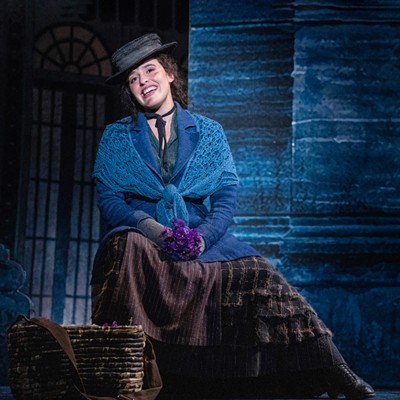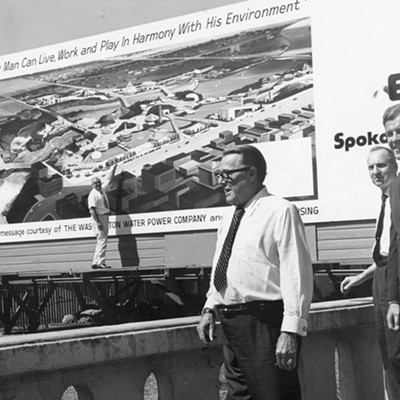
The set of Antoinette Nwandu's Pass Over, now entering a three-week run at Stage Left, is a nondescript street corner — a chain-link fence, a gray V of battered sidewalk, a solitary graffitied street lamp at its center. And yet for Moses and Kitch, the two homeless Black men at the center of Nwandu's play, this tiny patch of dirt and concrete has an existential significance. It's a form of limbo that they long to escape, if only their paths to the promised land didn't seem barred at every turn.
Pass Over immediately made ripples in both theatrical and activist circles when it debuted in 2017 at Chicago's Steppenwolf Theatre. That very same year, Spike Lee filmed a performance of the play for release at Sundance, followed by a wider release on Amazon's Prime streaming service in 2018. Locally, Pass Over soon caught the attention of key members of the Spokane Theatre Arts Council (STAC), who saw it as a timely and compelling vehicle for underrepresented voices, actors and themes.
Malcolm Pelles, a professor of screenwriting at Eastern Washington University and Pass Over's director, was involved in those early efforts to bring the play to regional audiences.
"We started meeting, just over coffee and stuff, talking about how there isn't theater being performed around the city written by Black playwrights with a Black cast. And so as a group we decided to be that change," he says.
STAC pitched the play to various area theaters and found Stage Left receptive to the idea of a staged reading. Pelles directed that reading in January 2020, which primed the pump for a full-blown production. Then, in what's become a familiar refrain, COVID hit, delaying their plans until now.
This new full production is allowing Pelles to tease out additional nuances of the show and its characters — with the added bonus, he says, of being able to "spend more time with the actors" as part of that process. Here, those actors are Dahveed Bullis (Moses), Matt Slater (Kitch) and Danny Anderson, who pulls double duty as Mister and Ossifer, two symbolic manifestations of White culture as experienced by Moses and Kitch.
The duo's repartee, as well as the sharp contrast between their dynamic relationship and their static surroundings, has frequently drawn comparisons to Samuel Beckett's absurdist classic Waiting for Godot. Whereas Kitch is "faster to find optimism" amid the debilitating forces that keep him and Moses anchored to this street corner, Bullis describes his own character as someone hardened by years of adversity and personal tragedy.
"In terms of the story, he has just recently lost his brother and watched Kitch lose his mom. There's all these friends they have lost. At what point do you really think you can keep fighting? Because if somebody showed an inch of fight, they're dead," Bullis says.
"I come from a fairly religious Southern Baptist background. And so I'm constantly interpreting Moses' actions and paralleling them with Moses' story in the Bible. It's no accident that this is called Pass Over and [my character is] Moses. The Bible is filled with people who are reluctant to step into who they're meant to be."
Kitch offsets Moses' reluctance with a steadying and encouraging presence, urging his friend to find some way to transcend this anonymous corner and all that it represents. Early versions of the play took a more cynical view of that possibility. But Nwandu revised the ending two more times to reflect different outcomes, with the recent Broadway iteration being the most hopeful of them. Pelles and Stage Left Managing Director Jeremy Whittington chose to use the playwright's second, more middle-ground ending for this production.
"This version balances optimism but also doesn't shy away from the realities of overpolicing and anti-Black racist vigilantism," Pelles says. "This version in particular speaks to this community."
And as intense and raw as some of its material is, Bullis says that Pass Over has more than its fair share of levity.
"I can see the temptation to make this a very heavy show where people are going to feel like they walked through mud. And they get out and say, 'Oh, man, it's hard to be anything that don't look like me.' That's a real easy thing to do, I think. I'm very happy with the direction we've taken the production in that we've found the lightness. There are lots of moments in the process where we've just been busting a gut."
Through that mix of humor, desperation, hope and resolve, Pass Over "is going to surprise you," he says. "And it's also going to invite you to do something. To think, to consider. This play really does invite every audience member to self-examine."
"This play is being produced at the right time," adds Pelles. "And, hopefully, it'll facilitate discussion and a perspective shift in people and also contribute to change here in the community. Plays like this can galvanize people, give them hope, give them faith to keep on fighting, to keep on speaking out. It's a long struggle to achieve justice." ♦
Pass Over • June 3-19; Thu-Sat at 7 pm, Sun at 2 pm • $25 • Stage Left Theater • 108 W. 3rd Ave. • stagelefttheater.org • 509-838-9727























